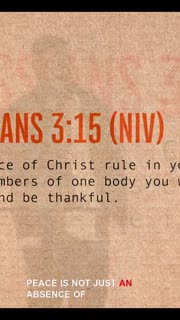Transformational Love: Living Out Christ's Compassion
Devotional
Sermon Summary
Bible Study Guide
Sermon Clips
1. "Think about the prince fighting for this princess. Think about the prince fighting through dragons and evil stepmothers and all kinds of chaos to get to this princess's heart. You got it? You got the story? You got the movie in your brain? Everybody good? Okay, great. So here's... Here's what I want you to do. I want you to picture these two at the altar. He's fought through every obstacle to get to this princess and he finally has her. He's won. And they get to the altar and the princess does the unthinkable. She grabs a wad of cash out of her dress. I don't know where she's placed it. Use your imagination. She's grabbed a wad of cash out of her dress and she looks at the prince and she says, Okay. How can I repay you? How can I pay you back for all that you've done for me? Well, that ruins the story, doesn't it? That's terrible. It's the worst ending ever." [44:01] (61 seconds)
2. "I did this simply because I wanted a relationship with you because I wanted your... your heart. And to be 100% honest, that's how many of our relationships are with Jesus. Right? We see this relationship with the loving Savior that God wrapped in flesh came to earth to rescue us from this sin problem. He died on the cross for us. And now, now we sit in a place where many of us are trying to earn the rescue. And he's like, no, no, no. That's never going to happen. That's never what the intention was. I was not doing this so that you would see love as transactional. I was doing this so that you would understand my love and desire me so much that my love for you would be transformational." [45:15] (48 seconds)
3. "We cannot earn God's grace. It is a free gift. That's literally what grace means. It is a, it's a gift that we get because of God's love. And so this love is radical. It doesn't really make sense to us. We don't really get it because oftentimes we see love is transactional. I give, so you give back, you give. So I give back in this type of love. This type of love should transform us. It should make us desire to be molded and shaped into the image of the one who first loved us. This love is transformational." [48:20] (40 seconds)
4. "When we were created in the image of God and Adam and Eve were created in the image of God and placed in the garden, and then they sinned against God, the one that created them, the one that had perfect union with them in the garden, God, didn't just say, okay, whatever you guys are done. You guys are now cut off from relationship with me. The human race is forever just finished. They will die in their sin. They have a sin sick terminal disease. They're they're done. I'll go and make another creation in my image. God didn't leave us that way. No, God saw our plight. He saw our mess. He saw us dying, soaking in the sin sick disease. And he came to earth, wrapped in flesh in the person of Jesus and live the perfect life that you and I could never live and then died the death that we should have died as a result of the terminal disease of sin and gave us his righteousness. As he took on our sin, he was moved to action. It was compassion on display." [49:23] (65 seconds)
5. "Humility is the Christlike attitude towards oneself, but here is how it's put on display. It's exemplified in a readiness to forego your own rights. Here's where this gets tricky, especially for us as Americans, it's exemplified and displayed in a willingness for us to forego our own rights. Now you have to hear me. Jesus did this first. Jesus came to earth. This is God wrapped in flesh, literally sitting in the throne room of heaven, had compassion on us and then came to earth and stood amongst the Pharisees and the religious leaders and the people that were trying to kill him and spoke no words and decided to be whipped for us and then go to the cross for us. He forewent every single right that he had so that you and I could be back in right relationship with God." [50:54] (54 seconds)
6. "Bear with each other is literally to restrain your natural reaction towards difficult people. Restrain your natural reaction towards difficult people, AKA, people. That get on your nerves before you react to them. You need to pause. You need to pray whatever your natural inclination is to say or do. Wait on that. Whatever you naturally want to say. I want to tell them that is a dumb idea or that is insane. He's like, wait, pause and ask Jesus by the power of his Holy spirit in that very moment. Like take a beat. If that person is standing across from you and you're having a conversation and they say something that sets you off, you just need to literally probably step back and wait and just be like this for a minute. And as they look at you and are like, what are you doing? Just be like, I'm trying to bear with others. But the only way that we can bear with others is if we are leaning and dependent on Jesus." [55:26] (65 seconds)
7. "When we think about that person in our mind, and this is the assessment that we need to take. This is the criteria, right? Jesus is like, are you patient and kind towards the person that you can't stand? Because that's what I am towards you. That's what Jesus says, right? When we were enemies of the kingdom of heaven, Christ died for us. When we wanted nothing to do with God, he still sent his son to die for us. And even if we are living in rebellion to the son, now he is still pursuing us, patient with us, kind with us, wanting us. Even if we call ourselves followers of Jesus and yet living in sin, and you think God wants nothing to do with you. I'm here to tell you this morning. He wants you and he is still pursuing you because it's not about how good you are. It's about his goodness and your unworthiness cannot change his goodness. That is the Jesus that we serve." [59:22] (56 seconds)
8. "Peace is not just an absence of disagreements. Actually it's, that's not it at all. It means that arguments and disagreements are dealt with at the deepest level, all parties by all parties, because we allow our, our unity in Jesus to settle the issue in our heart. Our unity with Jesus Christ conquers every disagreement. That you and I may have with one another, it means that we can walk away from a disagreement in humility and say, Jesus, if I'm the wrong party here, please show me if I'm the one that needs to apologize, please show me. And even if I'm not, if I need to re-approach the other party and say, listen, I'm sorry that we've had a misunderstanding, but everything's okay. Why? Because we're brothers and sisters in Christ Jesus. He's like, that's all that matters here." [01:01:22] (53 seconds)
9. "Think about the cross of Christ often. Think about Jesus often. Think about Jesus's blood poured out for you and I often. Think about how Jesus laid down his rights for you often. Listen, we cannot think about the cross of Christ often and stay in opposition to other people that are made in the image of Jesus. If you think about the cross often, if you think about Jesus often, not just when you come in here, not just when we take communion, not just when you're praying, like that's why he says, like pray without ceasing. Think about me often." [01:03:20] (37 seconds)
10. "Paul's last encouragement here is a check on behavior. He wants us simply to ask ourselves, can I do this if I'm representing the Lord Jesus? Can I continue to operate in this fashion? Can I continue to hate this person? Can I continue to be evil towards this person? Can I continue to not text that person back? Can I continue to not check on this individual? Can I continue to throw off an entire people group? Like can I continue to operate in this fashion if I'm operating like the Lord Jesus? Jesus's cross, his death, his burial and resurrection. It secured our reconciliation to both God and to one another, and this is the reason for our gratitude, that we would show our gratitude by living out this picture of reconciliation in our everyday life." [01:04:22] (51 seconds)
Ask a question about this sermon
2. "I did this simply because I wanted a relationship with you because I wanted your... your heart. And to be 100% honest, that's how many of our relationships are with Jesus. Right? We see this relationship with the loving Savior that God wrapped in flesh came to earth to rescue us from this sin problem. He died on the cross for us. And now, now we sit in a place where many of us are trying to earn the rescue. And he's like, no, no, no. That's never going to happen. That's never what the intention was. I was not doing this so that you would see love as transactional. I was doing this so that you would understand my love and desire me so much that my love for you would be transformational." [45:15] (48 seconds)
3. "We cannot earn God's grace. It is a free gift. That's literally what grace means. It is a, it's a gift that we get because of God's love. And so this love is radical. It doesn't really make sense to us. We don't really get it because oftentimes we see love is transactional. I give, so you give back, you give. So I give back in this type of love. This type of love should transform us. It should make us desire to be molded and shaped into the image of the one who first loved us. This love is transformational." [48:20] (40 seconds)
4. "When we were created in the image of God and Adam and Eve were created in the image of God and placed in the garden, and then they sinned against God, the one that created them, the one that had perfect union with them in the garden, God, didn't just say, okay, whatever you guys are done. You guys are now cut off from relationship with me. The human race is forever just finished. They will die in their sin. They have a sin sick terminal disease. They're they're done. I'll go and make another creation in my image. God didn't leave us that way. No, God saw our plight. He saw our mess. He saw us dying, soaking in the sin sick disease. And he came to earth, wrapped in flesh in the person of Jesus and live the perfect life that you and I could never live and then died the death that we should have died as a result of the terminal disease of sin and gave us his righteousness. As he took on our sin, he was moved to action. It was compassion on display." [49:23] (65 seconds)
5. "Humility is the Christlike attitude towards oneself, but here is how it's put on display. It's exemplified in a readiness to forego your own rights. Here's where this gets tricky, especially for us as Americans, it's exemplified and displayed in a willingness for us to forego our own rights. Now you have to hear me. Jesus did this first. Jesus came to earth. This is God wrapped in flesh, literally sitting in the throne room of heaven, had compassion on us and then came to earth and stood amongst the Pharisees and the religious leaders and the people that were trying to kill him and spoke no words and decided to be whipped for us and then go to the cross for us. He forewent every single right that he had so that you and I could be back in right relationship with God." [50:54] (54 seconds)
6. "Bear with each other is literally to restrain your natural reaction towards difficult people. Restrain your natural reaction towards difficult people, AKA, people. That get on your nerves before you react to them. You need to pause. You need to pray whatever your natural inclination is to say or do. Wait on that. Whatever you naturally want to say. I want to tell them that is a dumb idea or that is insane. He's like, wait, pause and ask Jesus by the power of his Holy spirit in that very moment. Like take a beat. If that person is standing across from you and you're having a conversation and they say something that sets you off, you just need to literally probably step back and wait and just be like this for a minute. And as they look at you and are like, what are you doing? Just be like, I'm trying to bear with others. But the only way that we can bear with others is if we are leaning and dependent on Jesus." [55:26] (65 seconds)
7. "When we think about that person in our mind, and this is the assessment that we need to take. This is the criteria, right? Jesus is like, are you patient and kind towards the person that you can't stand? Because that's what I am towards you. That's what Jesus says, right? When we were enemies of the kingdom of heaven, Christ died for us. When we wanted nothing to do with God, he still sent his son to die for us. And even if we are living in rebellion to the son, now he is still pursuing us, patient with us, kind with us, wanting us. Even if we call ourselves followers of Jesus and yet living in sin, and you think God wants nothing to do with you. I'm here to tell you this morning. He wants you and he is still pursuing you because it's not about how good you are. It's about his goodness and your unworthiness cannot change his goodness. That is the Jesus that we serve." [59:22] (56 seconds)
8. "Peace is not just an absence of disagreements. Actually it's, that's not it at all. It means that arguments and disagreements are dealt with at the deepest level, all parties by all parties, because we allow our, our unity in Jesus to settle the issue in our heart. Our unity with Jesus Christ conquers every disagreement. That you and I may have with one another, it means that we can walk away from a disagreement in humility and say, Jesus, if I'm the wrong party here, please show me if I'm the one that needs to apologize, please show me. And even if I'm not, if I need to re-approach the other party and say, listen, I'm sorry that we've had a misunderstanding, but everything's okay. Why? Because we're brothers and sisters in Christ Jesus. He's like, that's all that matters here." [01:01:22] (53 seconds)
9. "Think about the cross of Christ often. Think about Jesus often. Think about Jesus's blood poured out for you and I often. Think about how Jesus laid down his rights for you often. Listen, we cannot think about the cross of Christ often and stay in opposition to other people that are made in the image of Jesus. If you think about the cross often, if you think about Jesus often, not just when you come in here, not just when we take communion, not just when you're praying, like that's why he says, like pray without ceasing. Think about me often." [01:03:20] (37 seconds)
10. "Paul's last encouragement here is a check on behavior. He wants us simply to ask ourselves, can I do this if I'm representing the Lord Jesus? Can I continue to operate in this fashion? Can I continue to hate this person? Can I continue to be evil towards this person? Can I continue to not text that person back? Can I continue to not check on this individual? Can I continue to throw off an entire people group? Like can I continue to operate in this fashion if I'm operating like the Lord Jesus? Jesus's cross, his death, his burial and resurrection. It secured our reconciliation to both God and to one another, and this is the reason for our gratitude, that we would show our gratitude by living out this picture of reconciliation in our everyday life." [01:04:22] (51 seconds)










